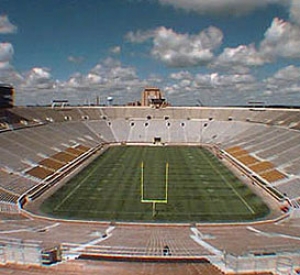For Better or Worse: Re-Evaluating Irish Expectations (Part 2)

I’m usually an optimist concerning most things. I’m the guy who sat in front of the television every Saturday afternoon during the 2007 football season yelling obscenities and screaming that the football team wasn’t playing as well as I thought they should. They weren’t playing up to my expectations, even though the expectations I had for the team were founded in wishful thinking rather than sound logic or reason. I had deluded myself into imagining that even though the team was full of underclassmen starting at key positions, that somehow the Irish persevere and have a real shot at pulling off a marginally-successful season. Did I learn anything from that year-long lesson in wishful-thinking?
Most Irish fans entered this season calculating that an 11-1 or 10-2 season would be a realistic final record for this football team. After all, the Irish were returning a heavily experienced offensive line, a seasoned quarterback, a stable full of talented running backs and wide receivers, and one of the best secondaries in the nation. However, even though we are only four games into the season, there are several events that have transpired and several weaknesses that have been revealed about this football team that begs the question, “Are the expectations we had coming into this season the same expectations we should have a third of the way through?” This article is the second in a two-part series addressing this very issue. In case you missed it, yesterday we had some guest writers from The Subway Alumni Show give their opinion on this very subject. You can read their thoughts right here in Part 1.
When addressing this subject, I believe a definite distinction needs to be made between the expectations for this year’s football team and the expectations for Charlie Weis—because they are two different things that have often been convoluted in the minds of the Irish faithful. It is these expectations surrounding Charlie Weis that have been magnified by two things.
First, anticipation for success under Weis is high for the very same reason that hopes for success has been high for every other Notre Dame coach that came before him—tradition. Historically, Notre Dame has fielded many great teams, but like Sprout said in yesterday’s article, if you judge how successful a team or a season has been based on their winning a National Championship, then Notre Dame has had 11 successful seasons, and I just don’t believe that that’s the case. However, the coach at Notre Dame is expected to consistently field elite teams. The other reason projections for Charlie Weis have been and continue to remain high are because of the hype and experience surrounding him when he was hired. It’s the same reason that people have great hopes for Jimmy Clausen and why fans forecasted great things for Ron Powlus when he came to Notre Dame. Charlie Weis had the coaching pedigree and a reputation of being an offensive genius. It is for these reasons that fans still desire a high level of coaching excellence and I can’t say I disagree with them. However, if Charlie Weis were to win a National Championship, these expectations for him and his coaching staff will only be pushed higher still.
On the other hand, expectations for a football team are very different in nature. They are based on skill, experience, and development rather than legend and reputation. On paper, this Irish football team is anticipated to be very good. They have skill and experience—the past several seasons have taught us that. However, the one x-factor in this year’s squad is development and this is where expectations for an entire team and the coaching staff intersect.
Coming into this season, Irish fans expected a potent offense, a productive passing and rushing offense, and a stout offensive line. However, they also anticipated solid tackling and secondary play as a result of the team’s high level of experience. However, four games into the season, needless penalties, sloppy tackling, poor defensive pressure that leads to poor secondary coverage can do nothing but lower expectations among realistic fans. Close games against Michigan, Michigan State, and Purdue cause bystanders to question whether or not Notre Dame can beat teams like Washington, USC, or even Pittsburgh.
While hopes have fallen at this point in the season, the majority of this does not fall on the team, but on the coaching staff. When expectations for a football team meet or exceed those for a coaching staff, then that program is achieving success. However, when expectations for a football team are lower than those of the coaching staff, then that program is not succeeding. Currently, the 2009 football team is in the latter category.
All is not lost. The season is not over. Like Eric mentioned in yesterday’s article, most of the problems seen on the field can be corrected by positive personnel development which stems from effective coaching from both Charlie Weis and his assistants. It’s far too early to be calling for the removal of Charlie Weis. However, at the end of the season, it will be necessary to not only make an emotional decision on whether or not Charlie Weis is still the man for this job, but it’s also necessary to look back and ask, “Were the expectations for this football team met?” Not only were they met from the standpoint of wins and losses, but were they met from the standpoint of development? The ultimate success of a football program is not how much talent they started with, but how much development in skill and discipline they ended with and that goes beyond wins and losses.

